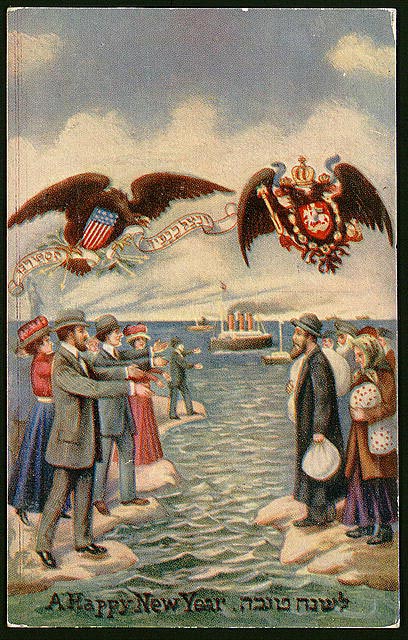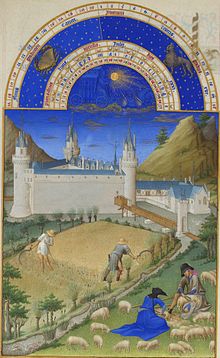The month of July, it seems, got its name from Julius Caesar, it being the month of his birth.
And this same Julius Caesar also created the Julian Calendar back in 46 BC.
Most of us here in the USA, of course, think of July as the month when we celebrate our country’s independence. Actually, most of us these days probably think very little about our country’s beginnings; it is simply a holiday meant to be enjoyed. But there is nothing wrong with tradition even if we sometimes forget what the tradition is all about.

In this Rosh Hashanah greeting card from the early 20th century, Russian Jews, packs in hand, gaze at the American relatives beckoning them to the United States. Over two million Jews would flee the pogroms of the Russian Empire to the safety of the US from 1881 to 1924.
I have lately been reading Isaac Asimov‘s autobiography entitled “In Memory Yet Green.” Reading about his childhood as a Russian-Jewish immigrant in the 1920s is simply fascinating. Here is an interesting article from the viewpoint of the women immigrants: Eastern European Immigrants in the United States (from Jewish Women’s Archive). Hard times for a lot of people; it is hard to even imagine what so many of them went through. But FREEDOM can be worth a lot. It is interesting to learn what America has meant to people from other places.
Regarding the 4th of July, I have found this interesting bit of history: on the 4th of July, 1898, Swami Vivekananda was traveling with some American disciples in Kashmir, and as part of a domestic agreement for the celebration of the day—the anniversary of the American Declaration of Independence — he prepared the following poem, to be read aloud at the early breakfast. (And apparently, his death – or resurrection, as some would prefer to call it – took place on the 4th of July, 1902):
TO THE FOURTH OF JULYBehold, the dark clouds melt away,
|
FREEDOM
|
Freedom is wonderful; let’s not forget, however, that with freedom comes responsibility. (And here’s an interesting discussion about that: Freedom & Responsibility — An Existential Overview.)
FINALLY – it is time for another month’s “31-point-plan.” And here it is:


